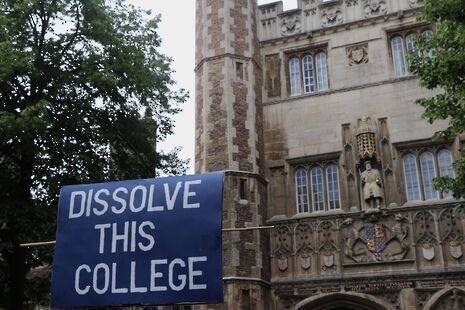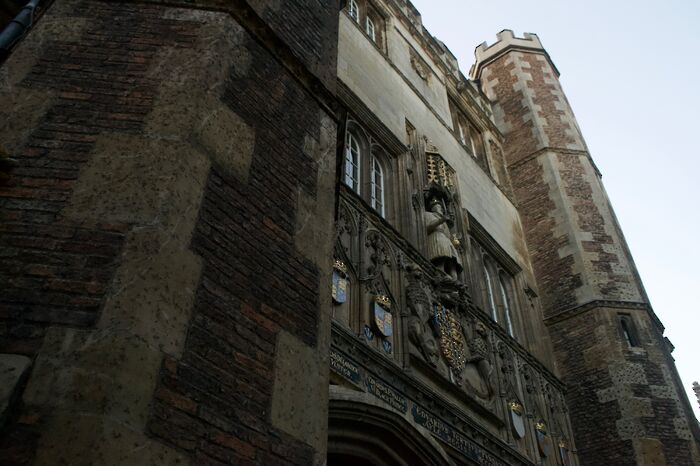Pressure builds on Trinity from its students and national trade union, as USS exit date nears
In a letter to Trinity fellows, UCU general secretary-elect Jo Grady wrote that the college’s exit from USS has “become a matter of national rather than local significance”

Less than a fortnight after Varsity revealed Trinity’s decision to exit the national pensions scheme for university staff, pressure has continued to build on the college.
Last week Cambridge academics announced an academic boycott of the College. Following this, the general secretary-elect of the University and College Union (UCU), Jo Grady, yesterday published a letter calling on Trinity fellows to ask the College's Council to reverse the decision. Trinity students have also written an open letter condemning the College's decision.
The letter, signed by 49 current students of the college, asks for Trinity to “consider its obligations not just to their students, severed from excellent supervisors in Cambridge, but to their colleagues and the wider community of academia.” Later today, the College will host an open meeting for students to raise their concerns.
Earlier this week, the Higher Education Sector Conference (HESC), which brings together academics across the UK, passed a motion calling on UCU to invoke the national censure and academic boycott procedure should Trinity not reverse its decision to leave the national pension scheme.
The opposition to Trinity College’s move to withdraw from the national pensions scheme follows Varsity’s report that the national pension scheme will be placed on ‘negative watch’ following Trinity’s decision to leave. In a document leaked to Varsity, national pension scheme chief Bill Galvin said that in the event of Trinity exiting and a second sizable institution following, the scheme’s financial stability rating could be downgraded from its current rating.
Trinity students who have signed the letter have further underlined the “vanishingly small” material risk to which the college is exposed as a member of USS, and pointed out that the cost to the college of leaving USS is estimated to be around £30m.
Grady similarly argued in her letter to the college that it “will not benefit from the decision to exit” and that “in fact, Trinity’s £1.4bn endowment faces more risk of being wiped out by sudden, unexpected economic downturns and other adverse changes than USS’s globally diversified, £64bn fund, which is backed by many more sponsors, including the universities of Oxford and Cambridge.”
Towards Trinity’s fellows, Grady outlined the rushed procedure that saw the exit from the national pension scheme pass, arguing that “the reports commissioned by the Council so far are incoherent, inadequate, and often inaccurate. They have not explained or weighed up the risks that actually face the College and the Scheme. You have not been given the kind of expert advice you need if you are to evaluate the Council’s plans properly.”
Anna Cardoso, who initiated the open letter by Trinity students, told Varsity that this was “a first step in collectively encouraging Trinity to change its mind” and that “further pressure should be expected if Trinity does not take their colleagues’ and students’ concerns about their decision to exit the pension scheme seriously”. Cardoso added that persistent opposition is likely to be amplified “when [the decision] endangers the research and education of its own students.”
The HESC motion for a national censure was passed on Sunday, two days after the Council of Trinity College Cambridge formally announced the withdrawal from USS. It follows an open letter, signed by over 270 Cambridge academic staff members, which pledges to withhold all teaching and research labour fronts the College, including supervising Trinity students.
The national censure and academic boycott procedure is a multi-stage approach that can be invoked by UCU. Under the first stage of the procedure, UCU can decide to put an employer on a censure list that is publicly exposed by the media and forwarded to academics. In a second stage of the procedure, invoked if the employer does not undertake corrective action, the institution in question can be placed on an academic boycott list which is circulated world-wide.
Academics are then called upon to withhold several types of academic contact from the respective institution, amongst them applying for any advertised jobs, speaking at or organising academic conferences and writing for any academic journal which is edited at or produced by the institution.
Several aspects of the boycott are likely to have immediate effect on the institution’s teaching, as well. For example accepting positions as visiting professors or new contracts as external examiners for taught courses will be withheld in the event of academic boycott. Academics are also asked to not hold lectures at the respective institution or to collaborate on research projects.
The HESC formulated its belief that the decision to withdraw from the national pension scheme “puts Trinity’s narrow interest in protecting its own assets ahead of the principle of mutuality in USS and the interest of higher education in the UK.”
Last year employees in higher education went on strike across 65 institutions nationwide against the proposed shift from a ‘defined benefit pension funds’ to a ‘defined contribution pension fund’ for incomes below £55,000 that was supposed to mitigate the scheme’s deficit. In practice, this move would have changed employees’ guarantee of an agreed-upon payment of pensions, where instead pensions would have been paid upon returns on the investment of contributions.
 News / Cambridge academics sign open letter criticising research funding changes22 February 2026
News / Cambridge academics sign open letter criticising research funding changes22 February 2026 News / University Council rescinds University Centre membership20 February 2026
News / University Council rescinds University Centre membership20 February 2026 News / Supporters protest potential vet school closure22 February 2026
News / Supporters protest potential vet school closure22 February 2026 News / Hundreds of Cambridge academics demand vote on fate of vet course20 February 2026
News / Hundreds of Cambridge academics demand vote on fate of vet course20 February 2026 Comment / A tongue-in-cheek petition for gowned exams at Cambridge 21 February 2026
Comment / A tongue-in-cheek petition for gowned exams at Cambridge 21 February 2026









